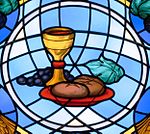
Back Epikleze Czech Epiklese German Epiklezo Esperanto Epíclesis Spanish Épiclèse (liturgie) French Epiklesis ID Epiclesi Italian エピクレーシス Japanese 에피클레시스 Korean Epiklese Dutch
| Part of a series on the |
| Eucharist |
|---|
 |
The epiclesis (also spelled epiklesis; from Ancient Greek: ἐπίκλησις, lit. 'surname' or 'invocation')[1] refers to the invocation of one or several gods. In ancient Greek religion, the epiclesis was the epithet used as the surname given to a deity in religious contexts.[2][3] The term was borrowed into the Christian tradition, where it designates the part of the Anaphora (Eucharistic Prayer) by which the priest invokes the Holy Spirit (or the power of God's blessing) upon the Eucharistic bread and wine in some Christian churches.[4] In most Eastern Christian traditions, the Epiclesis comes after the Anamnesis (remembrance of Jesus' words and deeds); in the Western Rite it usually precedes. In the historic practice of the Western Christian Churches, the consecration is effected at the Words of Institution though during the rise of the Liturgical Movement, many denominations introduced an explicit epiclesis in their liturgies.[5]
- ^ "ἐπίκλησις". Logeion.
- ^ Le Quellec & Sergent 2017, s.v. Épiclèse: "Épithète divine, dans le langage des hellénistes principalement, qui poursuivent en cela l'usage des Grecs anciens. Le mot signifie « nom » ou « surnom », et c'est ce dernier emploi qui amène à l'utiliser de préférence au mot plus courant « épithète »."
- ^ Brulé & Lebreton 2007.
- ^ "Epiklesis". Catholic Encyclopedia. Retrieved 2007-02-18.
- ^ Khoo, Lorna Lock-Nah (2005). Wesleyan Eucharistic Spirituality: Its Nature, Sources and Future. ATF Press. pp. 94–95. ISBN 978-1-920691-31-8.